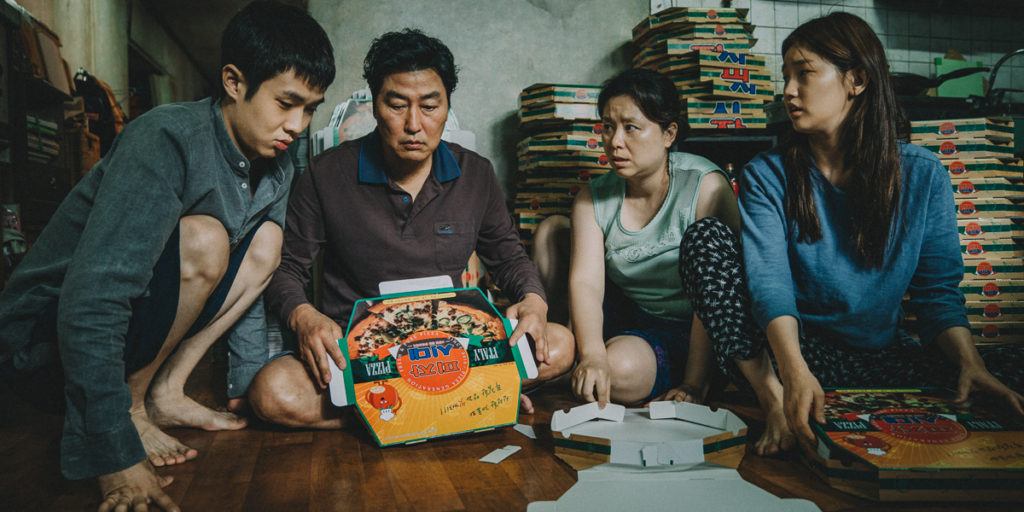Parasite

Image courtesy TIFF.
“If you make a plan, it never works out that way,” Says Mr. Kim (Kang-ho Song), to his son Ki-woo (Woo-sik Choi). The Kims live in the sub-basement level of stacked slums resembling an architectural landslide—not a trivial detail. In the opening scenes of Bong Joon Ho’s PARASITE, a shrewd negotiation over a contract job to fold several dozen pizza boxes quickly establishes the survival instincts of Ki-woo and his sister Ki-jung (So-dam Park).
Together, they forge academic documents to exploit the gullibility of a wealthy family scouting tutors for their own children—the Parks, Yeon-kyo (Yeo-jong Jo) and Dong-ik (Sun-kyun Lee). One by one, they deftly entrap the Parks’ driver and housekeeper, only to suggest their own father and mother as replacements. Soon, the entire family lives the life, one shift at a time, in a brutalist-modernist designer home built by its first owner, famed architect Namgoong¹. Like the manor of a classic Western caper, the house has secrets within secrets.
The Parks aren’t the hand-wringing, avaricious aristocrats of typical Western polemics on class warfare. While we catch one glimpse of Mr. Park’s tech company, AnotherBrick (itself a pun about planned obsolescence as a business model), we don’t ever see how he runs his business. A good father to his son, Da-song (Hyun-jun Jung), they go camping and play with walkie-talkies. His wife, Yeon-kyo, for all her stereotypical attributes—”CEO of Mom, Inc.” might be her Facebook profile if she were American—is affable if a bit naïve. Her son, the elder sister Da-hye (Ji-so Jung) suspects, puts them all on with his eccentricities arising from a childhood trauma, the origin of which no one truly understands. Is he a grifter, too?
The cleverness of PARASITE unfolds in slight deviations from what we expect—the aggregate effect striking us off-guard. Mistakes, misperceptions, and misunderstandings accumulate, like heavy rains at the bottom of a long staircase—a drip, a drizzle, a torrent, a deluge. Eventually, in this meticulously-crafted scheme, the Kims lose their foothold and tumble all the way back to bottom. The key twist isn’t shocking in itself; it’s in the way Bong stages the reveal. From the moment the doorbell rings, we step through the dimly lit corridor of narrative turns and twists, with no sense of what’s lurking around the next corner. The explanation is simple, not labyrinthine, so we don’t feel cheated by elaborate plot contrivances that don’t fit together. It doesn’t upend our whole understanding of the story, as does the unreliable narrator in THE USUAL SUSPECTS. It’s not that the breadcrumbs aren’t there. We don’t believe that they’re crumbs, let alone bread.
As with SNOWPIERCER, Bong Joon Ho’s running commentary on classism ruminates, like Ki-woo, on the comedy of misfortune. It never hammers you with the obscenity of income inequality, instead peppering it into the backdrop—dozens of bottles of VOSS sparkling water lining an oversized refrigerator in one scene, the Kim’s apartment flooding with sewage water in another. How do you make a commentary on income inequality when we’re so inured to it? Last year’s CRAZY RICH ASIANS, which broke American box office records for all-Asian cast cinema, celebrated Southeast Asian affluence as, bizarrely, the new currency of racial equality.
Collectively, Indian, Korean and Chinese cinema dwarf the market for Hollywood films. Early investors in DreamWorks SKG, the parent of CJ Entertainment, the distributors of Bong Joon Ho’s films and the Korean distributor for Paramount Pictures, the conglomerate CJ Group generates annual revenues of $59 billion.
Covering the Toronto International Film Festival, where power brokers decide the fate of hundreds of stories, I’m too keenly aware of the double-edged sword of theatre in service to the court. The powerful believe their own hype, and come to think that being manipulators of the rest of society is their “role” or “burden”. I’m unsure whether or not the Parks are high up enough the ladder. Yet from the news articles papering the wall in another sub-basement, we can see Mr. Park’s² a powerful tech magnate of some kind. There’s a cult mentality like that of Silicon Valley that sells itself on its own perceived benevolence. Of course they’re nice, their mother (Hye-jin Jiang), a former Olympian, says. There’s no misfortune the Parks simply can’t throw money at.
This begs a few questions of how PARASITE explores its core themes: Misfortune is an act of god, symbolized by an auspicious rock carried by the son. But who are the gods, exactly? The film remains conspicuously silent on this point, save for one fleeting moment when the father realizes that the true monsters are those who, through their power, influence, and blinding ignorance, pit the poor against one another.
The defenders of Libertarian ideology claim that success is only ever achieved through self-sacrifice and circuitously argue that if you’re poor, it must be because you didn’t try hard enough. This is the new religion of meritocracy, to which the middle class subscribe. It’s the lie we perpetuate while ignoring how the rich appoint themselves the executives, treasurers, magistrates, ministers, barristers, and lawmakers who set all the rules of society to their own advantage. At the mercy of exogenous forces, the plans of the impoverished easily derail. The rich don’t leave anything to chance.
- An inside joke: it’s the name of Kang-ho Song’s character in SNOWPIERCER.
- Throughout the film, characters use Western names when presenting themselves in a business context. A normal practice throughout the continent, due in large part to Western military occupation from the British in India to Americans in Korea and Japan, those unfamiliar with Asian culture may interpret these aliases to be part of the Kims’ grift. Ki-woo is Kevin. Ki-jung is Jessica. But Dong-ik is known to the business world as Nathan. And perhaps that’s the point: we Asians—Indians included—are so used to lying to ourselves and each other about who we are, so we can get onward and upward in a white man’s world.